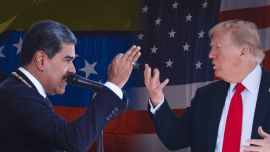President Javier Milei declared that Argentina’s new “era of change” was fully up and running in the early hours of Tuesday morning as he finally completed the signing of his long-trailed and renamed ‘May Act.’
During a brief ceremony heavy on patriotic traits staged on Independence Day, Milei played up the inking of his accord of political and economic ground rules as a sign of a new era.
However, the absence of at least six Peronist governors highlighted the divisions that exist in Argentina over the President’s budget-slashing and fund-withholding approach to office.
Milei, 53, chose the capital of Tucumán Province and the stroke of midnight on July 9 for his “historic” ceremony. The President arrived late, but was buoyed in his spirit, despite the cold weather outside.
After an introduction, 17 regional leaders and the mayor of Buenos Aires City inked up his national accord, with the event broadcast on national television.
Delivering a speech from the provincial capital of San Miguel de Tucumán, the La Libertad Avanza leader later hailed the accord as "symbolic of a change of era.”
"I would like to thank all those present for having gathered here today to renew our patriotic vows. I would like to thank deputies and senators from different parties,” continued the President. “Despite having been at loggerheads, they have the generosity to attend this call made by the Argentine people, who demanded a change of direction from the political leadership.”
Originally christened the ‘Pacto de 25 de Mayo,’ Milei first proposed the idea of a national accord at the opening of congressional sessions on March 1. He conditioned its signing on the passage of his sweeping ‘Ley de Bases’ omnibus bill and accompanying fiscal package through Congress, but his plan almost immediately ran into trouble.
After being forced to trim his reform push by lawmakers, the date was missed amid delays, eventually winning approval last month – hence the signing of the accord yesterday at the Casa Histórica de Tucumán.
The renamed ‘Acto de Mayo,’ or May Act, outlines key political and economic rules for governance that all administrations – local, provincial and national – should adhere to. It includes declarations on private property, public spending, reforms to the education, tax, labour and pension systems, and the exploitation of natural resources.
Attempting to draw parallels between Milei’s government and the nation’s founding fathers, the original 1853 National Constitution was put on display, next to the newly inked pact, on “the historic table on which the Act of Independence of our Homeland was signed," the government said in a statement.
Provincial support
After an introduction to the ceremony, the adhering governors were paraded out to sign the document and greet the President. Some were more comfortable than others – the Peronist governors of Catamarca, Raúl Jalil, and Santiago del Estero, Gerardo Zamora, for example, looked unsettled.
All of Milei’s Cabinet were summoned to the signing, with the sole absence Foreign Minister Diana Mondino, who was still in Paraguay at the Mercosur Summit, which President Milei decided not to attend.
Lower House Speaker Martín Menem (La Libertad Avanza), and the provisional head of the Senate, Bartolomé Abdala, signed on behalf of Congress. Vice-President Victoria Villarruel, suffering from flu, was not present and did not sign, though surprisingly, Milei’s sister, presidential chief-of-staff Karina Milei, did, despite not representing a specific branch of government or institution.
In a notable aside, the TV cameras captured an awkward greeting between Security Minister Patricia Bullrich and former president Mauricio Macri, who are at odds over the direction of the centre-right PRO party.
Bullrich, who has shown loyalty to Milei since joining his government, would like to see PRO move closer to the ruling La Libertad Avanza party, though Macri maintains a more conservative position.
Milei is seeking to build support for his government, his reform plan and his austerity measures, which have slashed public spending.
Poverty now affects more than 50 percent of Argentina’s population, according to private studies, and while runaway inflation has slowed to a monthly single digit, consumer prices have risen by more than 270 percent over the last 12 months.
The International Monetary Fund predicts that Argentina’s economy will contract by 3.5 percent his year.
Earlier in the day, Milei had attended the traditional Te Deum service at the Metropolitan Cathedral in Buenos Aires, during which Archbishop Jorge Ignacio García Cuerva highlighted the need to help those in Argentina "suffering from hunger and loneliness".
Citing the “so many Argentines lying on a blanket on the cold pavements of the country's big cities, prostrated as a result of the lack of solidarity and selfishness,” the archbishop called for a path towards “full development and a better quality of life for all.”
Alluding to recent remarks by Pope Francis, García Cuerva warned that this is “no time for indifference."
No-one can "wash their hands" of the social situation that we are experiencing as a country,” he declared.
Much division
In his speech, Milei sought to paint Argentina’s recent history as a disaster and to paint his accord as the foundation of a new stage in the nation’s development.
"The Constitution of 1853 gave us the golden age. It was the eruption of Argentina like a volcano from the depths of the abyss to the height of the heavens. Today, that Argentina seems a distant dream after a century of misery," he began.
"We do not look back or hold grudges, the only thing that politics has to do is to bring ideas to reality," Milei said in his nationally broadcast speech.
Despite the absences of at least six governors (including a late cancellation by Claudio Vidal from Santa Cruz, who said “it wasn’t the time for parties or big events”), Milei went on to hail the signing as “the symbol of a change in era … after so much division.”
"We don't look back, we don't persecute our opponents for thinking differently,” said Milei, who has cut federal revenue-sharing funds to provinces and stopped discretionary transfers from the Casa Rosada to regional coffers.
“However, there are many political, social and trade union leaders who are not here. In some cases because their ideological blinkers make them unaware of the root of the failure, in others out of fear or shame for having persisted in error for so long. And in many cases because they do not want to give up the privileges that the old order gave them,” railed Milei.
He accused the absentees of being blinded by “ideological” biases and of not wanting to “give up their privileges.”
Milei said those who didn’t attend were “addicted to the system for their personal interests,” stating that their political progress comes at the “cost of making it worse for Argentines as a whole.”
His opponents rejected those allegations.
“The only pact we accept in Buenos Aires Province is one that defends federalism, industry, work and national resources, one that guarantees the rights and welfare of the people of Buenos Aires," said Governor Axel Kicillof in a statement on the X social network.
"The history of our independence teaches us that the strength of Argentina lies in its diversity, reflected in the federalism that unites us and gives us sustenance as a nation. Today we reaffirm our commitment to these principles that guarantee the well-being of all Argentines,” posted La Pampa Governor Sergio Ziliotto on the same medium.
The other governors who did not travel to Tucumán were Ricardo Quintela (La Rioja), Gildo Insfrán (Formosa) and Gustavo Melella (Tierra del Fuego).
The signing of the May Pact will now see the creation of a new ‘Council of May,’ made up of representatives of the government, the provinces, the chambers of Congress, trade union organisations and business. They will now work up proposals to enforce the 10 points laid out in the signed agreement.
A number of leading business chambers voiced their support for the new accord on Tuesday morning.
The so-called ‘Group of Six’ – made up of the Association of Argentine Banks (ADEBA), the Buenos Aires Stock Exchange (BCBA), the Argentine Chamber of Commerce and Services (CAC), the Argentine Chamber of Construction (CAMARCO), the Argentine Rural Society (SRA) and the Argentine Industrial Union (UIA) – said the agreement “must become a platform for a country that inexorably needs to move along the path of development.”
10 points from the ‘Pacto de Mayo’
Milei’s accord consists of the following 10 points, with the educational item a recent incorporation:
– The inviolability of private property.
– Fiscal balance is non-negotiable.
– Reduction of public spending to its historic levels of around 25 percent of Gross Domestic Product.
– A useful and modern primary and secondary education with full literacy and without school dropouts.
– A tax reform which reduces the tax burden, simplifies the life of Argentines and promotes commerce.
– A renewed discussion of federal revenue-sharing to end for good the current extortionate model which the provinces suffer.
– The commitment of the Argentine provinces to advance in the exploitation of the country’s natural resources.
– A modern labour reform which promotes formal employment.
– A pension reform which makes the system sustainable and respects those who have contributed.
– Opening up to international trade so that Argentina can again be a protagonist of the global market.


























Comments